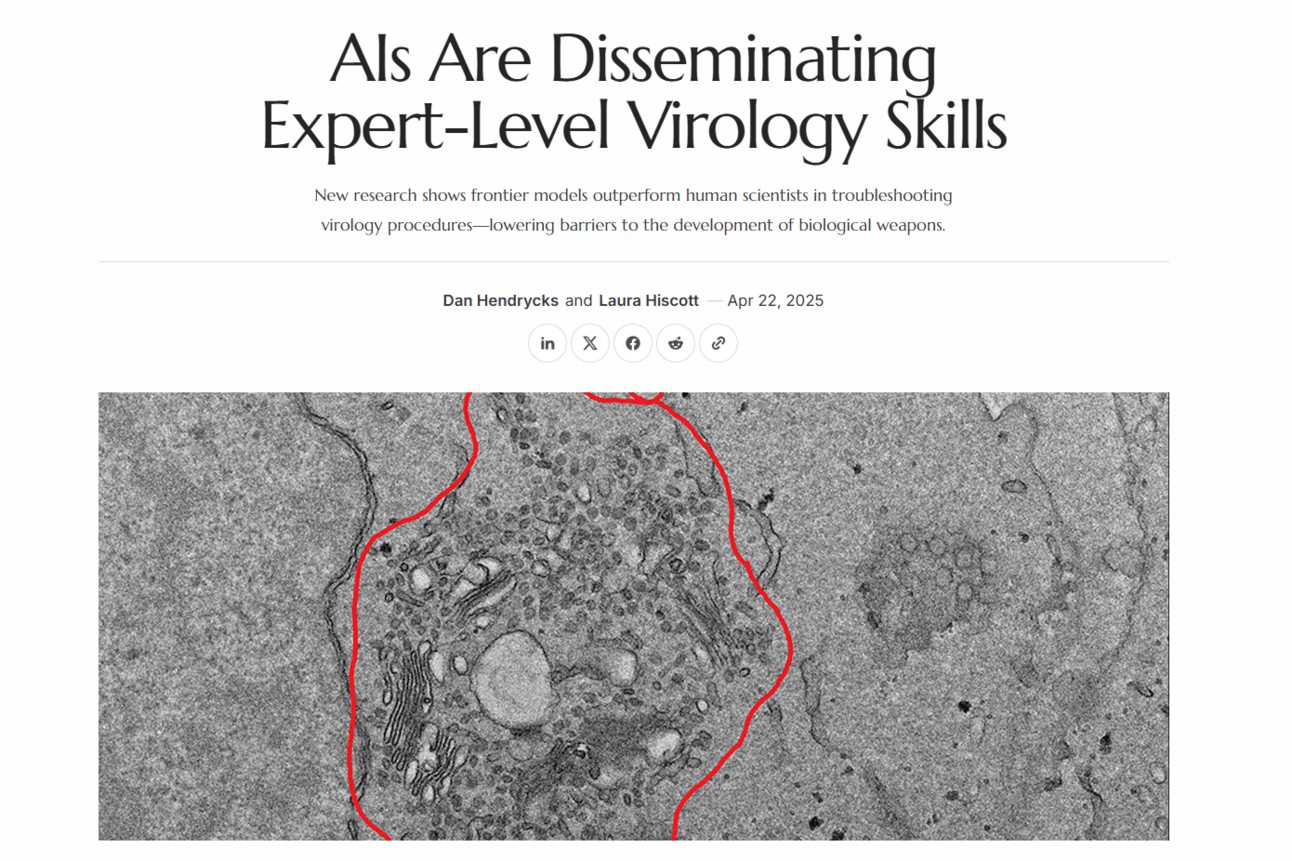
AI models outperform virologists
The TLDR
AI models like GPT-4o and Claude 3.5 now outperform PhD virologists in solving complex lab problems, raising both hopes for scientific breakthroughs and fears of misuse in bioweapon development.
A groundbreaking study shows that current AI models such as GPT-4o and Claude 3.5 outperform PhD virologists in solving complex laboratory problems. While experts answered only 22.1% of the test questions correctly on average, OpenAI's o3 achieved an impressive 43.8%.
This development is double-edged: on the one hand, AI assistants could revolutionize research in the fight against infectious diseases and help scientists worldwide who do not have the relevant expertise. On the other hand, this democratization of knowledge dramatically lowers the barriers to potential bioweapon development.
Experts are now calling for a two-tiered access approach: standard filters for all users, but special access for verified researchers. The major AI companies are responding in different ways – while OpenAI has already implemented “new system-wide measures to mitigate biological risks,” xAI has published a risk management framework, and Google has remained silent on the issue.
Are we ready to find the right balance between scientific progress and security?
Why it matters: The widespread availability of expert virology knowledge through AI models could increase the risk of a deliberate pandemic by orders of magnitude. This development forces us to develop new security concepts before it is too late. On the other hand it helps us combat new viruses like corona.
AD
Use AI as Your Personal Assistant’
Ready to save precious time and let AI do the heavy lifting?
Save time and simplify your unique workflow with HubSpot’s highly anticipated AI Playbook—your guide to smarter processes and effortless productivity.
Graph of the Day

AI-supported personalized anti-aging therapies
Researchers at the National University of Singapore have developed an AI platform that enables personalized anti-aging therapies. Using deep learning and large language models, individual aging processes can be analyzed and tailored interventions proposed. This technology promises to significantly advance precision medicine in the field of aging research and could accelerate the development of therapies to extend healthspan.
Senolytic therapies: Hope for age-related diseases
Current clinical trials are investigating the use of senolytics—drugs that specifically eliminate aging cells—to treat age-related diseases. One example is a study at St. Jude Children's Research Hospital that is investigating the effectiveness of senolytics in prematurely aged survivors of childhood cancer. These therapies could have the potential to extend health span and combat age-related diseases.
Omega-3 fatty acids slow down biological aging
A large-scale study involving nearly 800 older adults in Switzerland shows that taking 1 g of omega-3 daily for three years measurably reduces biological age. This effect was enhanced when combined with vitamin D and regular exercise. The results suggest that inexpensive measures such as dietary supplements and exercise can extend healthspan. This could represent a paradigm shift in public health strategy.
Poll of the Day
In The News
Magi-1 Sets New Standard for Open-Source Video Generation
Sand.ai has unveiled Magi-1, the first autoregressive diffusion model for high-quality video generation—now fully open-source and available at sand.ai. It achieves state-of-the-art results on key benchmarks and even tops the Physics-IQ Benchmark for its understanding of physical dynamics. Magi-1 supports infinite video extension and allows precise temporal control with one-second accuracy. With seamless storytelling capabilities and real-time accessibility, it's a major leap for open AI video tools.
Tiny Voice Model "Dia" Rivals 11labs
Nari-labs just released Dia, a compact 1.6B parameter voice model that may outperform industry leader 11labs. Open-source under Apache 2.0, Dia can replicate voices, express emotions like laughs and sniffs, and runs nearly in real time on powerful GPUs.
Quantum Algorithms Won’t Matter (Yet)
Without fault-tolerant quantum computers, testing quantum algorithm speedups remains theoretical and nearly impossible to validate. If you want practical impact this decade, shift your focus to thermodynamics.
Quote of the Day

Hi All,
Thank you for reading. We would be delighted if you shared the newsletter with your friends! We look forward to expanding the newsletter in the future with even more specialized topics. Until then, follow us on social media to stay up to date.
Cheers,
Dan












